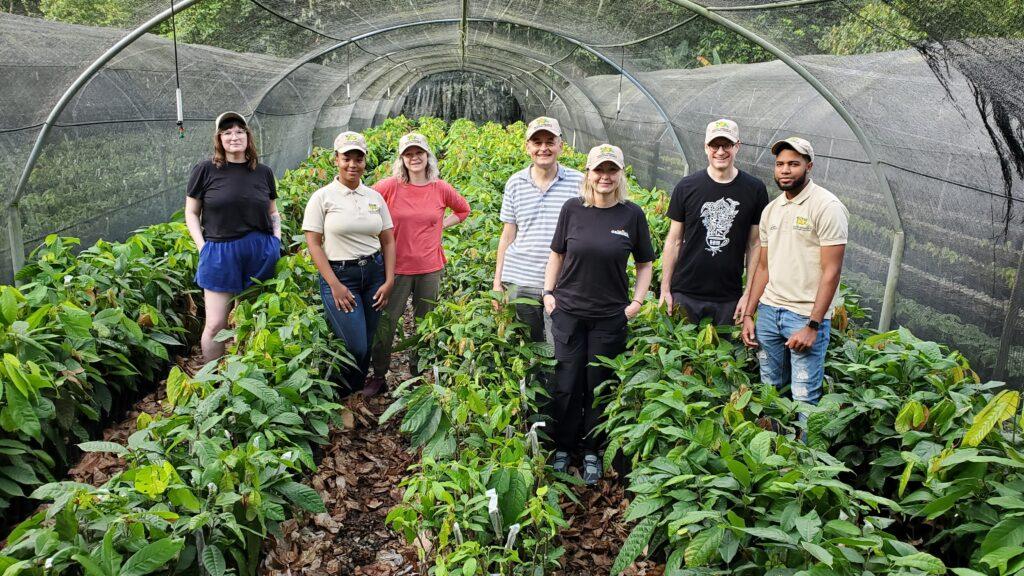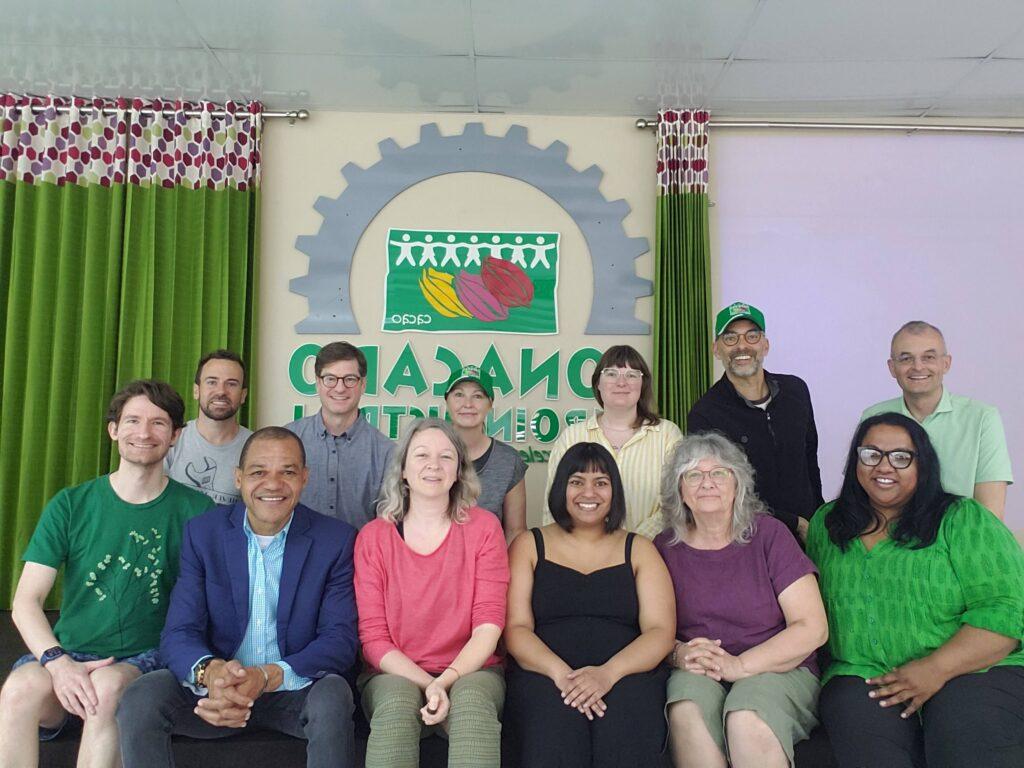We realize that some of you already know a great deal about the value of fair trade. This year you might consider sharing that value with your loved ones or colleagues who may not know as much about it as you. In light of the need to change our trading models and unequitable food systems, we wrote this newest article in the hope you could share it around.
Maybe you’re already a connoisseur of fair trade products, or maybe you just buy them now and then. Consider using your purchasing power to make a tangible difference this year. Choose just one regular product in your pantry to swap out for a fair trade one this year. Make it a new habit and experience the difference.
What Is Fair Trade?

Fair trade is a way of conducting business with the Global South that ensures a fair and sustainable supply chain and to fairly pay the people who produced their own goods. The types of traded goods can range from textiles to food. Fair trade strives to keep small producer-farmers as active participants in the global marketplace. Fair trade is in no way charity, but a trading model that treats farmers with respect.
Just as with other certifications, products that are certified fair trade undergo a thorough certification process. For example, all Camino products are fair trade certified by Fairtrade Canada, a non-profit certification and public education organization promoting fair trade to improve communities of family farmers.
What Difference Does It Make?
In our Western cultures, we are used to the notions of minimum wage and relatively high standard of living, so talking about improved working conditions in the South might seem like we’re talking about another century. But there are places where children can’t go to school because the family farm barely ekes out a living and they receive so little for their crops, the whole family has to work to survive. There are still places in the world where modern day slavery still exists. On top of that, supply chains are muddied with the shadow of colonialist business practices.
Fair trade practices offer an alternative to our conventional trading systems, ensuring living wages and decent humane working conditions for producers and farm workers. It ensures there are measures in place to prevent forced labour and child labour. It also ensures sound environmental practices and fosters lasting business relationships. When producers are treated with decency and paid fairly, it gives them the time and energy to care for their families, their land, and their communities.
For example, the purchase of Camino products ensures a fair deal for small farmer-producers by:
-
- Guaranteeing fair prices to family farmers;
- Paying premiums to improve social conditions in communities of family farmers;
- Paying family farmers in advance to assist in long-term planning and pre-harvest financing;
- Supporting democratic participation in farmer-owned co-operatives;
- Ensuring that there is no forced labour;
- Supporting sustainable farming practices.
Buying fair trade products really does make a difference. It makes a difference between just scraping by or putting enough food on the table. It makes a difference between conventional, unhealthy agricultural practices or farming practices that will help sustain our planet.
The power of our choices
 Another interesting aspect of fair trade is it empowers consumers to make purchases that support their values. Every consumer casts a vote of sorts with every purchase they make at the store. Thoughtful purchasing on a large scale would turn the entire supply chain on its head. Not convinced? Consider the thunderous noise of a waterfall or the power of a flood, which are simply collections of individual drops of water. Your purchase matters.
Another interesting aspect of fair trade is it empowers consumers to make purchases that support their values. Every consumer casts a vote of sorts with every purchase they make at the store. Thoughtful purchasing on a large scale would turn the entire supply chain on its head. Not convinced? Consider the thunderous noise of a waterfall or the power of a flood, which are simply collections of individual drops of water. Your purchase matters.
It’s worth considering including fair trade products in your grocery cart. When you do, two things spring to the foreground: price and quality. It’s not so much that fair trade is so expensive, but we have grown used to paying too low a price for these items. Give the farmers back what they’re due. These goods are, in fact, imported luxury goods, not basic foods. But you also will be blown away with the superior flavour and overall quality. Fair trade products are grown and made with great care. You really can taste the difference.
If you already buy some, or even if you buy no fair trade products regularly, consider adding just one to your shopping list. You might not be ready to go in whole hog just yet. But have a look in your pantry and choose just one non-fair trade product to flex your purchasing power, as part of your new purchasing habits.
A good resource to help decide what to make with your newfound purchases is The Fair Trade Ingredient Cookbook by Nettie Cronish. The cookbook explores fair trade products through its delicious, yet easy recipes.
Swap one product and taste the difference
Fair trade food products are becoming increasingly easier to find, even in conventional grocery stores. Here are a few to look for to get started:
-
- Cocoa powder

- Cane sugar
- Hot chocolate
- Chocolate bars
- Baking chocolate
- Chocolate chips
- Bananas
- Coconut and coconut products
- Coffee
- Tea
- Rice
The first one on the list is a good staple if you don’t have fair trade cocoa powder in your cupboard. The flavour is superior, and a tin of cocoa powder lasts most households for quite a while. It’s also versatile and is just at home in smoothies and pudding as it is in baking. You can also make your own homemade hot cocoa, sweetened just how you like.
Have a look at these recipes using cocoa powder, including a new one for your own homemade hot chocolate.

Most of the cocoa beans used to make Camino cocoa powder come from the Dominican Republic, sourced from 2,000 producers that make up the co-operative FUNDOPO (Fundación Dominicana de Productores Organicos). The average farm size of FUNDOPO’s farmer-producer is approximately 5 hectares of productive land, previously used for subsistence crops. Traditional cultivation techniques and low levels of mechanization have made the region ideal for total organic transition – resulting in some of the highest-quality cocoa in the world. Of the Fairtrade premiums, one of the pillars of Fairtrade’s model, 25% of FUNDOPO’s Fairtrade premiums are paid directly to the producers, while the other 75% are used for co-op projects.
It might seem like a small change, but it does make a big difference to the farmers at the beginning of the supply chain. And if everyone swaps one product this year, another product next year and so on, like the waterdrops in the waterfall, together we can sweep away the murky links in our food supply chain.


